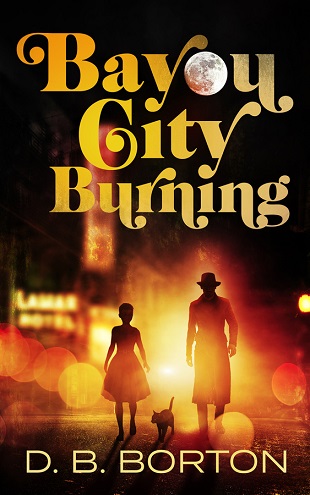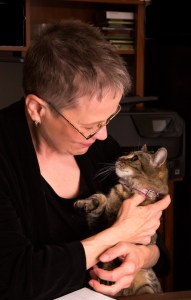Please help me welcome D.B. Borton to the blog as today’s Wednesday’s Guest. She is the author of Bayou City Burning, the first book in a new mystery series that I reviewed here last Sunday. Since the story takes place in Houston, TX in the summer, when even the sidewalks melt in the summer, maybe a cool glass of iced tea is in order. Those of us who are still shivering in the cold of winter can pretend. We are good at that. Right?

What prompted you to set your story in 1961?
You may be surprised to learn that the answer is mathematical (my accountant will definitely be surprised to learn that!). I was drawing heavily on my own childhood in Houston, and I wanted Dizzy to be a certain age—specifically, not yet a teenager. Dizzy is actually a little older than I was in 1961.
The discovery of all the historical events taking place in the spring and summer of 1961—especially regarding the moon mission and plans to bring a space center to Houston—was pure serendipity. As most writers will confirm, that happens more often than you’d think.
 The book reads a little bit like a Noir PI story, with a whole lot of Nancy Drew thrown into the mix. How did you come to write it that way?
The book reads a little bit like a Noir PI story, with a whole lot of Nancy Drew thrown into the mix. How did you come to write it that way?
These are both genres I have enjoyed in the past. My love of mysteries started with Nancy Drew. I discovered hard-boiled detective fiction much later in life, when I became a film student, so I saw the movies before I read the books. BAYOU CITY BURNING began with a simple question: what would a hard-boiled detective look like ten or twelve years down the road, when he had orthodontist’s bills to pay?
Why did you decide to make Dizzy such an important character? She’s a delight, by the way.
Dizzy was part of the original conception; I never thought of not making her an important character. I always assumed that both Harry and Dizzy would narrate. What I couldn’t decide was which of the two should open the book. I actually asked friends of mine, a couple, to read both versions—one in which Dizzy’s narration came first (the original version I wrote) and one in which Harry’s narration came first—and they agreed that Harry should speak first, but that Dizzy should speak soon afterward. Of course, an older Dizzy gets the prologue.
Do you enjoy writing stories with a Noir feel to them? Are more planned?
I hadn’t done it before, and I had a lot of fun with it. The model for me was Raymond Chandler, and it’s a delightful challenge to attempt to imitate his style. I am planning further books in the Harry and Dizzy Lark series.
If you could go through a wormhole, would you go into the future, the past, or stay right here? Why?
I’m perfectly content to stay where I am. Many middle-class Baby Boomers like me led privileged lives. We didn’t experience the hardships of the Depression or World War II, and we didn’t experience the kinds of pressures that kids do today, when social media contribute to an epidemic of bullying and depression among young people.
What gives you the most pleasure in writing?
Living vicariously through the characters and inhabiting the worlds I create.
What other creative things do you do?
For many years I was a potter, but I was never good enough to satisfy myself. Now that I’m retired, I plan to find an art form that is cheaper and more portable with less environmental impact. I also hold a third-degree black belt in Aikido.
 ABOUT THE AUTHOR: A native Texan, Borton became an ardent admirer of Nancy Drew at a young age. At the age of fourteen, she acquired her own blue roadster, trained on the freeways of Houston, and began her travels. She left Texas at about the time everyone else arrived.
ABOUT THE AUTHOR: A native Texan, Borton became an ardent admirer of Nancy Drew at a young age. At the age of fourteen, she acquired her own blue roadster, trained on the freeways of Houston, and began her travels. She left Texas at about the time everyone else arrived.
In graduate school, Borton converted a lifetime of passionate reading and late-night movie-watching into a doctorate in English. She discovered that people would pay her to discuss literature and writing. But because she found young people interesting and entertaining, she became a college teacher. Later, during a career crisis, she discovered that people would pay her to tell stories, although even less than they would pay her to discuss stories written by someone else.
Borton is the author of two mystery series—the Cat Caliban series and the Gilda Liberty series—as well as the recent mystery Smoke and the comic novel Second Coming. She draws on her academic research to write a blog on the history of girl detectives, available on her WEBSITE, where you can join her mailing list. You can also follow her on FACEBOOK
BOOK BLURB: It’s hard to be hard-boiled when your biggest fan and worst critic is your 12-year-old daughter, especially when she’s cracking your case for you and defending you from the bad guys, joined by pals human and feline.
Comedy meets mystery and history in the summer of 1961, when Houston is still a cowboy backwater—overheated and under-air conditioned. P.I. Harry Lark and his daughter Dizzy team up to solve several mysteries. The Freedom Riders are inspiring the local civil rights movement and the dockworkers are preparing to strike, so things are really heating up when an out-of-towner entangles P.I. Harry Lark with President Kennedy’s moon mission. LBJ and his Texas cronies are plotting to get NASA to build a space center in Houston, but somebody is out to stop them.
![]()
BUY LINK
![]()

Thanks for the interview, Maryanne. You ask such thoughtful questions! I’m looking forward to reading DEAD TOMATO and others of your books.
Glad you enjoyed the interview process, D.B. These are always fun, and lets readers know some interesting things about an author that they might not see elsewhere. I do hope you enjoy A DEAD TOMATO PLANT & A PAYCHECK. That one was a lot of fun to write.